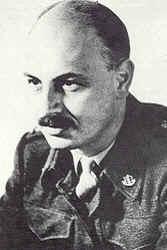Yigael Yadin
(1917 - 1984)
Yigael Yadin was born in Jerusalem and joined the Haganah in 1933. He became a key figure in the Haganah leadership, was its operations officer, and helped devise and implement many of the strategies used in the War of Independence. Following the establishment of the State, he was named the second Chief of Staff of the Israel Defense Forces (IDF), and served in that capacity from 1949-1952. During his tenure, Yadin reorganized the standing army, the system of compulsory military service, and the reserves.
Yadin left the army in 1952 and, himself the son of archaeologist Eliezer Sukenik, studied archeology at the Hebrew University of Jerusalem. He earned his Ph.D. in 1955 on research into one of the Dead Sea Scrolls, and for this he was awarded the Israel Prize in Jewish Studies in 1956. In the following years, Yadin continued his research in archeology and antiquities, teaching and publishing prolifically. Among his best-known works are Masada (1968) and Tefillin from Qumran (1969). In 1970 he became head of the Institute of Archeology at the Hebrew University.
Yadin’s fieldwork, conducted in the 1950’s and 1960’s, encompassed many important excavations at a range of sites, including Hazor, caves of the Judean Desert, Masada, and Meggido. Employing thousands of volunteers from Israel and abroad, his vast archeological digs expanded the field tremendously. Yadin’s findings have shed light on various periods of ancient Israel, such as the Canaanite, First Temple, and Herodian periods, as well as the Bar Kokhba revolt. Perhaps his most famous contribution was his decoding and interpreting of several scrolls from the Dead Sea and the Judean Desert.
Yadin also did much to make archaeology a more accessible and less exclusively esoteric field. His writing is both scholarly and of interest to more widespread audiences. He strove not only to document his archaeological findings but to place them in a cultural context and understand them as an avenue to cultural history. Yadin was also instrumental in acquiring the Dead Sea Scrolls for Israel and highlighting them in the Israel Museum’s Shrine of the Book, thus bringing these archeological treasures closer to the public.
In his later life, Yadin’s career in archeology was complemented by several public posts. In 1967, he served as military advisor to Prime Minister Levi Eshkol, and following the Yom Kippur War he served on the Agranat Commission that investigated the lapses which led to the surprise attack. In 1976, Yadin formed “Dash” (Democratic Movement for Change), a new political party dedicated to electoral reform. In the elections of 1977, the party won 15 Knesset seats and joined the first Likud government. Although the party itself broke up two years later with little achievement in restructuring electoral politics, Yadin served as deputy prime minister from 1977 to 1981, following which he retired from political life, returning to his research until his death in 1984.
Courtesy of:
http://www.jewishvirtuallibrary.org/jsource/biography/yadin.html

